TICAD8 Side Event Examines Human Security in Africa
2022.12.07
Destabilizing factors such as the COVID-19 pandemic and the Russia-Ukrainian War have caused severe socioeconomic, financial, and governance disruptions in African countries. Additionally, the continent suffers from underlying structural crises which hinder their attainment of Sustainable Development Goals (SDGs).
On August 23, 2022, the Japan International Cooperation Agency (JICA), together with Afrobarometer, a research network that conducts public attitude surveys in Africa, and the United Nations Development Programme (UNDP) co-hosted a webinar titled "Revisiting Human Security in Africa." This event brought together a panel of distinguished experts to address the interrelationships between economic, social, and environmental factors that influence development outcomes and challenges in Africa. This was a side event to the eighth Tokyo International Conference on African Development (TICAD 8), which is the latest of high-level international summits on Africa's development initiated by Japan in 1993. Director General Makino Koji and Visiting Fellow Mine Yoichi of JICA Ogata Sadako Research Institute for Peace and Development participated in the event.
Kato Ryuichi, then vice president of JICA, opened the event by pointing out that Africa is facing new challenges which undermine fundamental human rights. He referenced a joint study of JICA and Afrobarometer titled “Revisiting human security in Africa in the post-COVID-19 era,” in which they use the concept of human security as “an analytical lens to understand people’s subjective perceptions of what makes them feel safe or unsafe.” He emphasized JICA's commitment to safeguarding lives, livelihoods, and dignity across Africa, while also strengthening Africa's long-term resilience.
Following Kato’s remarks, Ahunna Eziakonwa, United Nations assistant secretary-general and UNDP’s regional director for Africa, delivered the keynote speech. Citing data from UNDP’s 2022 Human Development Report, she reminded participants that global feelings of insecurity increased in recent years even before the Covid-19 pandemic. She further explained how Africa’s susceptibility to domestic and external shocks could undermine decades of development gains and worsen human security conditions. Eziakonwa added that “we must address the root causes that made global insecurity so endemic.”
Next was a presentation by Professor Guy Lamb from Stellenbosch University, who provided an analysis of the Afrobarometer survey, which reviewed the state of human security in six African countries (Angola, Gabon, Kenya, Namibia, Nigeria, and Tunisia) at various stages of development. He examined the challenges faced by these countries and made several suggestions, including that human security frameworks should provide useful insights into human development. In his view, enhanced planning and resourcing based on human security frameworks should be prioritized when governments prepare for future emergencies.
Commenting on the presentation, Mine, who is also a professor of Doshisha University agreed that the seven elements of human security identified in the study, namely economy, food, health, environment, personal, community and politics, should be considered a complex whole “because a single security issue always has multiple repercussions in other security areas.” He noted that although some findings seem to be straightforward in terms of causal relationships, there are also paradoxical results in the study. One of them is that survey results indicate that relatively poor people could be much more optimistic about the future than wealthy people. He proposed examining real conditions and people’s perceptions based on gender, age, occupation, ethnicity, and rural/urban location.
In the panel discussion that followed, Mine and Makino participated as panelists along with Blessings Chinsinga, minister of Local Government, Malawi; Sheila Shawa, senior technical and partnerships specialist at Health, Humanitarian Affairs and Social Development, African Union Commission; and Raymond Gilpin, chief economist and head of Strategy, Analysis and Research Team at UNDP Africa. Several topics were raised, including what could be the roles of governments and organizations in addressing human security issues and how human security is perceived and addressed in Africa.
As Chinsinga pointed out, it is essential to understand the relationship between external and internal factors in influencing human security, because all too often, there is the tendency to ignore the roles of external factors and blame African governments for the lack of agency. He advocated for fostering a culture of mutual learning and exchanging experiences among nations, as well as collaborating on research projects.
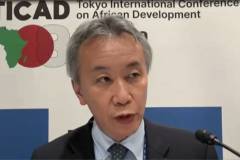
Kato Ryuichi, then vice president of JICA

Ahunna Eziakonwa, United Nations Assistant Secretary-General and UNDP’s Regional Director for Africa
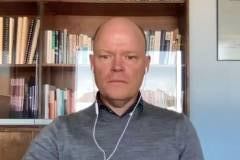
Guy Lamb, professor at Stellenbosch University
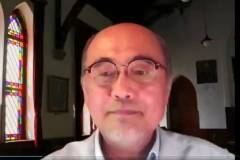
Mine Yoichi, visiting fellow at JICA Ogata Research Institute

Blessings Chinsinga, minister of Local Government, Malawi
Shawa explained that it is critical that national policies are in line with the promotion of various aspects of human security. She added that it is also important to raise awareness and have a common discourse focusing on building solutions and not magnifying the problems. She noted the need for private sector involvement to support the government's initiatives. Although governments may not be able to be fully prepared for health crises, she said, they should nonetheless implement novel surveillance and treatment systems to cope with the next crisis.
Makino explained that the path of human development could be volatile and unstable because countries as well as people and communities face the interaction of threats such as COVID-19, climate change and violent conflicts. By taking into account cascading effects of threats, he also pointed out that we need to take a multisectoral approach and nurture a close collaboration between governments, civil society, the businesses and international development partners.
Mine added that using seven areas of human security in the survey was an effort to transcend bureaucratic divisions and pointed out that indicators of human security, like those developed for Japanese municipal governments, might be crucial for meaningful development interventions. He suggested that Japanese and African policymakers work together in this area.
During his remarks, Gilpin noted the important questions we should address are “not just how we identify the elements of human security and how we measure them, but what this tells us about how we do development across Africa” since for the last three or four decades “we have been struggling to manage poverty and not to manage development.” He advised to amass high frequency data and do more modelling to understand the relationships between the various drivers of development and security. Moreover, he acknowledged the importance of using multidimensional vulnerability indices tailored to Africa's diverse contexts.

Sheila Shawa, senior technical and partnerships specialist at Health, Humanitarian Affairs and Social Development, African Union Commission
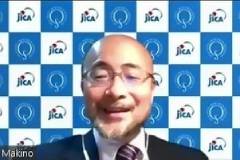
Makino Koji, director general of JICA Ogata Research Institute
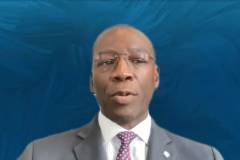
Raymond Gilpin, chief economist and head of Strategy, Analysis and Research Team at UNDP Africa
In the Q&A session, the audience asked questions pertaining to the effects of the Russia-Ukrainian War on Africa, and more.

事業事前評価表(地球規模課題対応国際科学技術協力(SATREPS)).国際協力機構 地球環境部 . 防災第一チーム. 1.案件名.国 名: フィリピン共和国.

事業事前評価表(地球規模課題対応国際科学技術協力(SATREPS)).国際協力機構 地球環境部 . 防災第一チーム. 1.案件名.国 名: フィリピン共和国.

事業事前評価表(地球規模課題対応国際科学技術協力(SATREPS)).国際協力機構 地球環境部 . 防災第一チーム. 1.案件名.国 名: フィリピン共和国.

事業事前評価表(地球規模課題対応国際科学技術協力(SATREPS)).国際協力機構 地球環境部 . 防災第一チーム. 1.案件名.国 名: フィリピン共和国.

事業事前評価表(地球規模課題対応国際科学技術協力(SATREPS)).国際協力機構 地球環境部 . 防災第一チーム. 1.案件名.国 名: フィリピン共和国.
scroll